“... during the search of the defendant’s cabin, the Government found a letter written to Earth First!ers. Its title was ‘Suggestions for Earth First!ers from FC.’ That letter stated in part, ‘As for the Mosser bombing’ — and I’m quoting now — ‘our attention was called to Burson-Marsteller by an article that appeared in Earth First!, Litha,’ ...”
Ted Kaczynski
Suggestions for Earth First!ers from FC
Note to the archivists by Ted
This is material that I had considered sending to Earth First! journal, but I did not send it, it would have been in the same piece as the foregoing appendix.
Suggestions for Earth First!ers
from FC
Earth First! wants to eliminate the industrial form of society. This is clearly a revolutionary goal. Yet it seems that many or most Earth First!ers still think and act like reformers, not like revolutionaries.
This is illustrated by Darryl Cherney’s response to the bombing in which we assassinated the president of the California Forestry Association. According to newspaper reports Cherney was upset by the bombing because he was afraid that there would be retaliatory attacks on Earth First!ers. Now we respect (with certain qualifications) the nonviolent principles of Earth First! (even though we don’t think it would be practical for everyone to abide by them) and if any Earth First!ers get beaten up in retaliation for our bombings we certainly sympathize with them. But Cherney’s reaction shows that his mentality is that of a reformer, not a revolutionary.
To a revolutionary, what is important is not the short-term goal of saving this or that bit of wilderness or securing some grudging tolerance from the timber industry sympathizers. What is important is the long-term goal of weakening and destabilizing industrial society so that a revolution against it may become possible. From this point of view it is desirable that timber industry sympathizers should make physical attacks on Earth First!ers, because such behavior tends to increase the social stresses in industrial society and helps to turn people against the system.
It is important to distinguish between what the industrial system “wants” and what certain people who claim to represent the system may want or may do. By what the system “wants” we mean that which helps to assure the survival and growth of the industrial system. This corresponds approximately with what is desired by the most rational, self-restrained and “responsible” members of the systems [sic.] controlling elite. But people who believe themselves to be supporters of the system often behave in ways that are harmful to the system and thus serve as unwitting allies of those who want to overthrow the system.
Take police brutality as an example. The most rational and “responsible” members of the system’s elite are against police brutality. They want the police to use just enough force (and no more than just enough) to insure [sic.] public order and obedience to the system’s rules, because they know that police brutality increases social stresses and tends to break down respect for the system. Bad cops (or timber industry goons) who beat people up regard themselves as pro-system and hate those who are against the system, but the behavior of such cops actually helps to undermine the system. Thus police brutality is not really a part of the system, but is a kind of disease of the system.
Similarly, the irresponsible politicians who are currently repealing environmental laws may be acting as unwitting allies of revolutionaries. If their actions lead to a few more cases like Love Canal and the Exxon Valdez oil spill, they will be helping to destroy respect for the system. Moreover the actions of these politicians help to weaken the standards of decent, “responsible” political behavior on which the stability of the system depends.{1} What the rational, self-controlled, “responsible” members of the system’s elite want is not reckless repeal of environmental legislation; they want enough environmental legislation to preserve the system’s image of benevolence but not enough to interfere very seriously with economic growth and the increase of the system’s power. They want exploitation of natural resources that is rationally planned for long-term economic growth and stability, and that takes into consideration social needs (e.g. health, esthetics) as well as economic ones. Like police brutality, environmental recklessness is not really a part of the system, but is a disease of the system.
Needless to say, police brutality and environmental recklessness make us sick at the stomach, and we know that Earth First!ers react the same way. And of course we have to stand against these things. But at the same time it has to be recognized that ending police brutality and environmental recklessness are goals of reformers. The goal of revolutionaries is to undermine the system as a whole, and to this end police brutality and the grosser forms of environmental recklessness are actually helpful.
The trouble with Earth First!ers is that, like reformers, they devote their attention almost exclusively to fighting evils that are peripheral outgrowths of the system rather than fighting those institutions, structures and attitudes that are central to the system and on which the system most depends. We’ve only read about 6 or 8 issues of Earth First!, but if these can be taken as a fair sample then EF! articles are devoted almost exclusively to wilderness and environmental questions. These are extremely important matters, but if you devote your attention exclusively to them you will never overthrow the industrial system, and as long as the system survives the most you can hope to do is slow, not stop, the taming or destruction of wilderness. Therefore we argue that the Earth First! journal should devote at least half of its content to questions that have central relevance to the development of the industrial-technological system. How about some articles on genetic enigineering and its probably consequences for life on earth? How about some articles concerning the tremendous powers that computer technology is putting in the hands of the system? What will be the consequences if the computer scientists ever succeed in developing machines that are more intelligent than human beings? How about some articles on propaganda and other psychological tools that help to induce behavior that conforms to the needs of the system?
Most importantly, you need to develop a coherent ideology that opposes technology and industrialism and is based on analysis and understanding of the industrial system, and you need to develop plans and methods for weakening, undermining and destabilizing industrial society.
As for action, with only one exception all the actions we’ve seen reported in Earth First! have been focussed on environmental and wilderness issues. But as long as you fight only on environmental and wilderness issues you are fighting defensively. The best defense is a good offense, and to fight offensively you’ve got to get out of the woods and attack the structures that make the system run. For example, instead of demonstrating (or monkeywrenching) at a logging site, you might demonstrate (or monkeywrench) at a chemical plant. And the issue that you demonstrate about should not be a particular case of environmental destructiveness but the very existence of the chemical industry itself. You have to use your ingenuity to devise some forms of action that will weaken the system as a whole, not just slow its destruction of the environment.
* * *
Another indictaion of Earth First!’s essentially reformist mentality is your attitude about the paper industry. You want to stop the cutting of trees for paper by finding alternative sources of fiber, such as hemp. This is a reformist attitude. The revolutionary attitude would be: Stop cutting trees for paper, and if that means that the system comes grinding to a halt for lack of paper, so much the better. To hell with the system.
You will answer that if your program implied an end to the mass production of paper, then you would have no chance of putting that program into effect, because few people would support a program incompatible with the continued existence of industrial society.
But of course! That is the difference between the reformer and the revolutionary. The reformer seeks to bring about some improvement in conditions NCW, by means that are compatible with the survival of an existing system of society. The revolutionary advocates measures that are incompatible with the existing system, knowing that those measures cannot be put into effect now . But by advocating such measures he plants in people’s minds the idea that doing away with the existing system is a conceivable alternative. In this manner he helps to prepare the way for a future revolution that may occur when the time is ripe.
* * *
Some Earth First!ers think they can change the system just by providing, through their own actions, examples of noble, nonviolent, passive, environmentally nondestructive behavior. But it won’t work. Look at history! It’s been tried before, repeatedly. The earliest Christians, the Quakers, certain Hindus and Buddhists relied on passive, nonviolent loving-kindness, but they had little or no lasting effect on the behavior of the human race in general. people of the saintly type may have an important role to play in a revolutionary movement, but their kind of action by itself cannot bring down the industrial system. For that, revolutionaries of a tough, practical type are needed.
* * *
It is a big mistake to complain about “capitalism.” To do so gives the impression that industrial society would be OK if it were run according to some other ideology, such as socialism. Actually socialism in Eastern Europe did more damage to the environment than any capitalism did in the West. Our enemy is not capitalism, socialism, or any other ideology that may pretend to guide the system. Our enemy is the industrial-technological system itself.
* * *
The Earth First! journal should have a section in which successful monkeywrenching operations are reported. Reading about successful operations will encourage and stimulate other monkeywrenchers. Those who have carried out successful operations should report their action to the journal in an anonymous letter. Such letters will constitute evidence in “criminal” cases, so the journal will have to turn them over to the police to avoid prosecution for obstruction of justice. Therefore senders of the letters should make sure they bear no evidence such as fingerprints or handwriting.
Also, after every major successful monkeywrenching operation, the saboteurs should send anonymous letters to the mainstream media explaining both the reasons for that particular monkeywrenching attack and the long-term goals of the radical environmental movement.
The effectiveness of monkeywrenching operations will be greatly increased if they are systematic and coordinated rather than random and sporadic. Each monkeywrenching group should plan not just one operation but a campaign of operations lasting several months. Such a campaign is best designed not to attack a lot of unrelated targets, but to concentrate pressure on some particular class of targets. For example, the monkeywrenching group might select a particular logging or mining company, or a chemical or electronics firm, and attack a series of targets belonging to that particular organization. It would be difficult to coordinate the efforts of different monkeywrenching groups without compromising security. But some degree of coordination might be achieved by passing the word through the grapevine that a certain week is to be a week of intense sabotage. A lot of sabotage concentrated into one week would be more effective than the same amount of sabotage spread out over an extended period.
FC
Earlier Draft
... As for the Mosser bombing, our attention was called to Burson-Marsteller by an article that appeared in Earth First!, Litha, June 21, 1993, page 4. According to this article, “The BC Forest Alliance (a timber industry trade group) has retained the services of the world’s largest public relations firm, Burston-Marsteller Ltd. of New York. This company practices a highly sophisticated form of conflict management, and has previously represented the Argentinean government, Union Carbide after Bhopal; and Exxon after the Exxon Valdez oil spill. Burston-Marsteller has apparently had quite a bit to do with shaping the provincial media’s coverage of forest and other environmental issues.” We realized that this article was not necessarily an unimpeachable source of information, but we didn’t bother to try to verify the above statement because, as we mentioned in our last letter to the NY Times, our attack on Burson-Marsteller was based mainly on general principles rather than on any specific actions of the company. Now it turns out that though Burson-Marsteller has been representing Exxon, it did not do so specifically in connection with the Exxon Valdez incident. To us it makes little difference. The technique of public relations is part of the system of propaganda that is one of the slimiest aspects of modern society. Today people’s buying habits, their voting choices and their attitudes to a significant extent are ...
... no longer results of their own spontaneous decisions but are molded by skilled propagandists: advertising agencies, public relations firms, political campaign managers and so forth. It stinks.
Someone raised the question of why we didn’t attack an Exxon executive. Actually, at one time we had planned to do so, but after the Reso kidnapping we figured that Exxon execs would be too suspicious and cautious....
Appendix
... for a leftist, Goldberg is fond of certain catch-words.... In her brief article she uses “capitalism” once, “genocide” twice and ... “(neo-)colonialist” or “(neo-)colonialism” thirteen ... claims that “genocide (against Indians) is current and ... This is absurd. The word “genocide” was originally ... describe the extermination of the Jews by the nazis. The ... reasonably be applied to some nineteenth century events in ... tribes were relocated through forced marches in which the ... was extremely high. But to apply the word “genocide” to ... treatment of Indians by whites is to compare it to the treatment of Jews by the nazis, and that is ridiculous in the eyes of ...
On population control
Draft #1
After writing the foregoing we decided to send you the following letter, which we urge you to print in Earth First! Compare paragraphs 204, 205 of our manuscript, "Industrial Society and its Future."
We share the disgust of other Earth First!ers at the overblown state of the world's population. But in refraining from having children, Earth First!ers may be making a disastrous blunder. There is strong scientific evidence that social and political attitudes tend to be inherited. No one suggests that there is a gene for attitude. But it appears that children inherit personality traits that make them likely, in the context of the present society, to adopt this or that attitude or ideology.
It is true that some scientists question these results, but their objections are rather flimsy and appear to be ideologically motivated. In any case it is a common observation, which even these scientists do not deny, that children do tend on the average to adopt social and political attitudes similar to those of their parents. It doesn't matter all that much whether parents transmit attitudes to their children through training alone or whether heredity also plays a role. The effect is the same.
By refraining from having children, Earth First!ers may be handing the world over to the growtHs. (“GrowtH” is our private word for anyone who favors economic growth and all that crap.) Because the growtHs have as many children as they like, while EF!ers and other environmentalists restrict their reproduction, it is likely that with each successive generation the proportion of growtHs in the population with increase.
It is vitally important to reduce the Earth’s population as much as possible, but the best way to reach a goal is not always to head directly toward it.
What the Earth’s population will be 50 or 100 years from now depends entirely on the form of society that will then exist. The present economically oriented form of society, based on industrialism, tends inexorably to grow to the limit of the available resources. By creating new genetically altered plants, or maybe through some type of artificial photosynthesis, this form of society will greatly increase the world’s food producing capacity, and will allow or encourage its population to grow to the limit of that capacity. So if the present form of society survives, we can expect for the future an incredibly, horribly overcrowded world in which no room will be left for wild nature.
Therefore, the important goal is to eliminate the present form of society and destroy the industrial base that makes it possible to support an abnormally inflated human population.
If Earth First!ers give a reproductive advantage to the growtHs by refraining from having children, they will be slowing present population growth only slightly, and they will be increasing the likelihood that the growtHs will win out, that the present form of society will survive, and hence that the world of 50 or 100 years from now will be horrifyingly overpopulated.
If Earth First!ers have as many children as they can, they will be accelerating present population growth only slightly, and they will be increasing the number of radical environmentalists, hence the probability that the present form of society can be eliminated, and consequently the likelihood that the Earth’s population can be greatly reduced in the future.
Those who imagine that they can persuade the human race in general to refrain from reproducing by setting an example of non-reproduction themselves are wildly unrealistic fools. They are playing right into the hands of the growtHs.
It would be best for Earth First!ers to outbreed the growtHs until the present form of society has been done away with.
FC
Draft #2
I share the disgust of other Earth First!ers at the sight of somebody with four or five kids. But in refraining from having children, Earth First!ers may be making a disastrous blunder. In careful statistical studies of identical twins and adopted children, a number of investigators, working independently, have found that social and political attitudes tend to be inherited. Of course, no one suggests that there is a gene for liberalism, for conservatism, or for radical environmentalism. But it appears that children inherit personality traits that make them likely, in the context of the present society, to adopt this or that attitude or ideology. It is true that some scientists question these results, but their objections are rather flimsy and appear to be ideologically motivated.
By refraining from having children, Earth First!ers may be handing the world over to the growtHs. (“GrowtH” is my private word for anyone who favors economic growth and all that crap.) Because the growtHs have as many children as they like, while EF!ers and other environmentalists restrict their reproduction, it is likely that with each successive generation the proportion of growtHs in the population with increase.
It is vitally important to reduce the Earth’s population as much as possible, but the best way to reach a goal is not always to head directly toward it.
What the Earth’s population will be 50 or 100 years from now depends entirely on the form of society that will then exist. The present economically oriented form of society, based on industrialism, tends inexorably to grow to the limit of the available resources. By creating new genetically altered plants, or maybe through some type of artificial photosynthesis, this form of society will greatly increase the world’s food producing capacity, and will allow or encourage its population to grow to the limit of that capacity. So if the present form of society survives, we can expect for the future an incredibly, horribly overcrowded world in which no room will be left for wild nature.
Therefore, the important goal is to eliminate the present form of society and destroy the industrial base that makes it possible to support an abnormally inflated human population.
If Earth First!ers give a reproductive advantage to the growtHs by refraining from having children, they will be slowing present population growth only slightly, and they will be increasing the likelihood that the growtHs will win out, that the present form of society will survive, and hence that the world of 50 or 100 years from now will be horrifyingly overcrowded.
If Earth First!ers have as many children as they can, they will be accelerating present population growth only slightly, and they will be increasing the number of radical environmentalists, hence the probability that the present form of society can be eliminated, and consequently the likelihood that the Earth’s population can be greatly reduced in the future.
It could even be argued that rapid population growth now will be advantageous in the long run, because if population expands rapidly in the immediate future, this will increase the likelihood that economic and social problems will overwhelm the present form of society, so that it will not survive and will be replaced by something else. If population increases at only a moderate rate in the the [sic.] immediate future, the present society may have time to adjust, to develop new methods of food production and so forth, so that it will have a better chance of surviving. If it does survive, you can be sure that 100 years from now no wild nature will be left and the world will be jam-packed with people.
So it would be best for Earth First!ers to outbreed the growtHs until the present form of society has been done away with.
Fabius Maximus
Pictures of the original texts

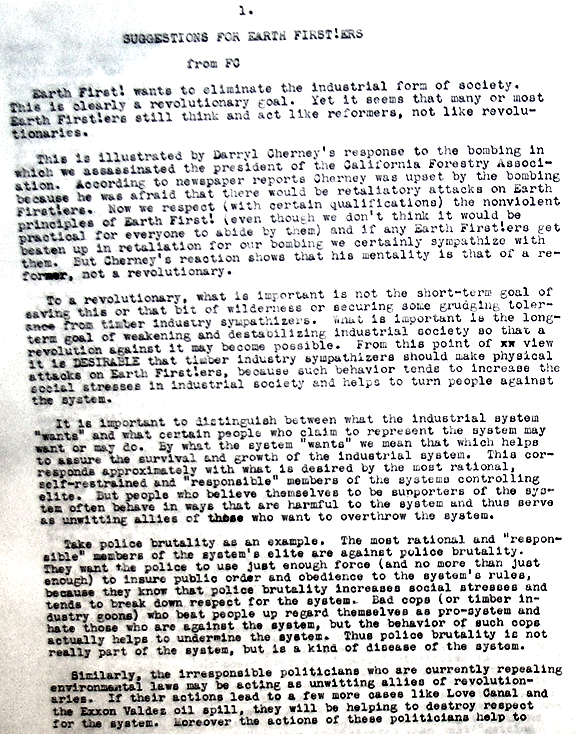
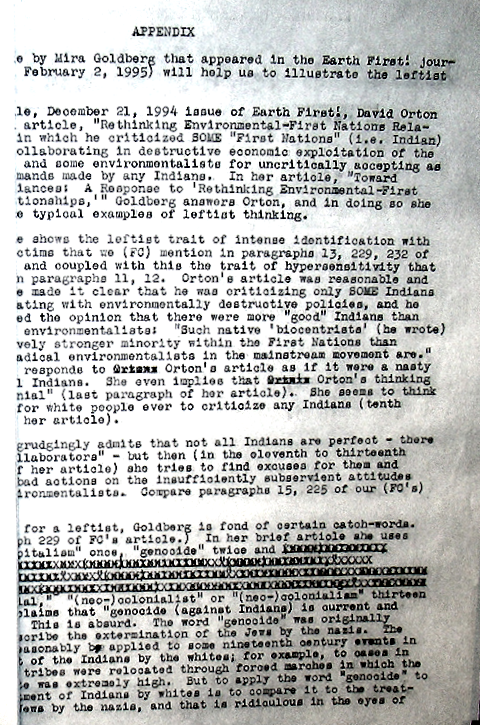
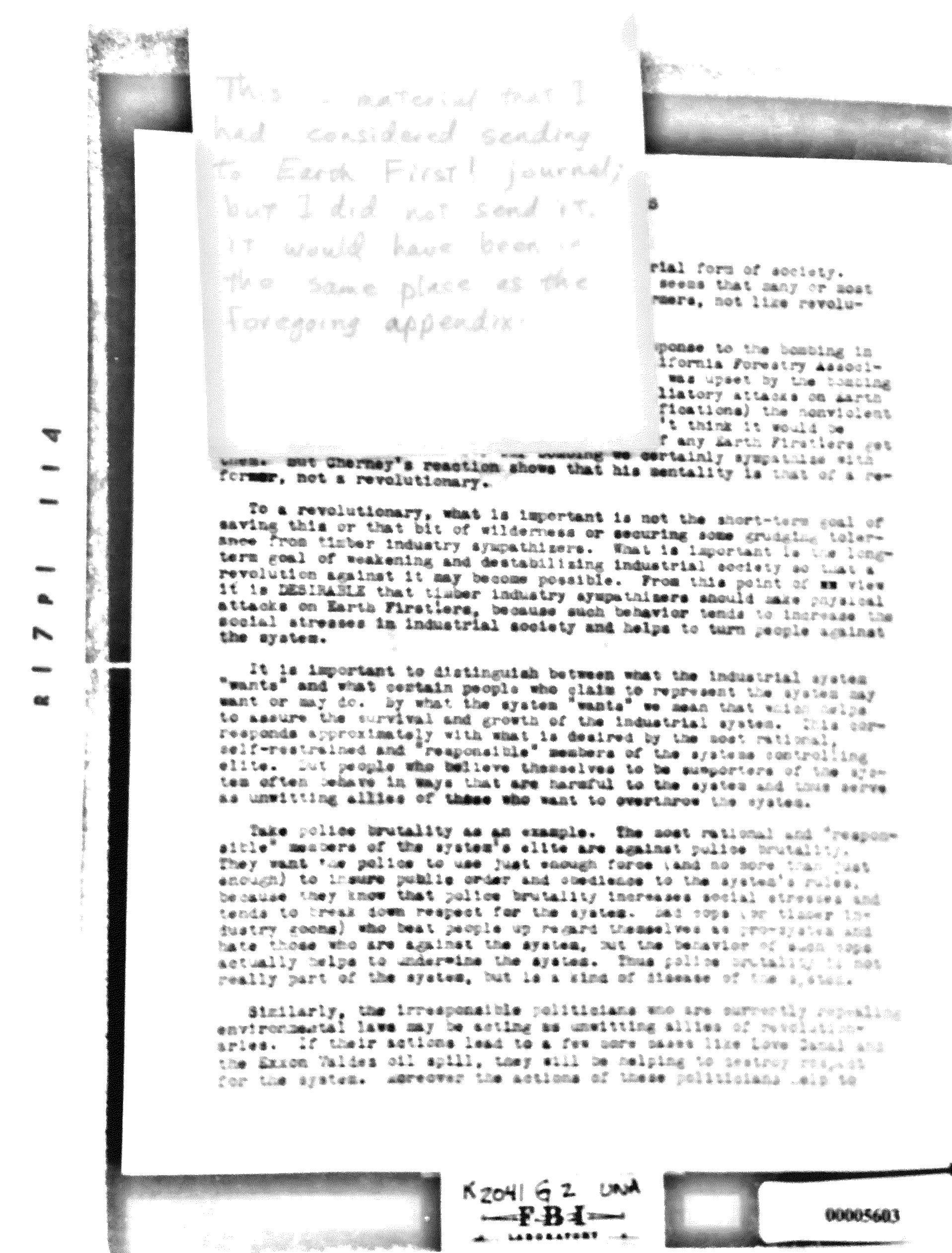
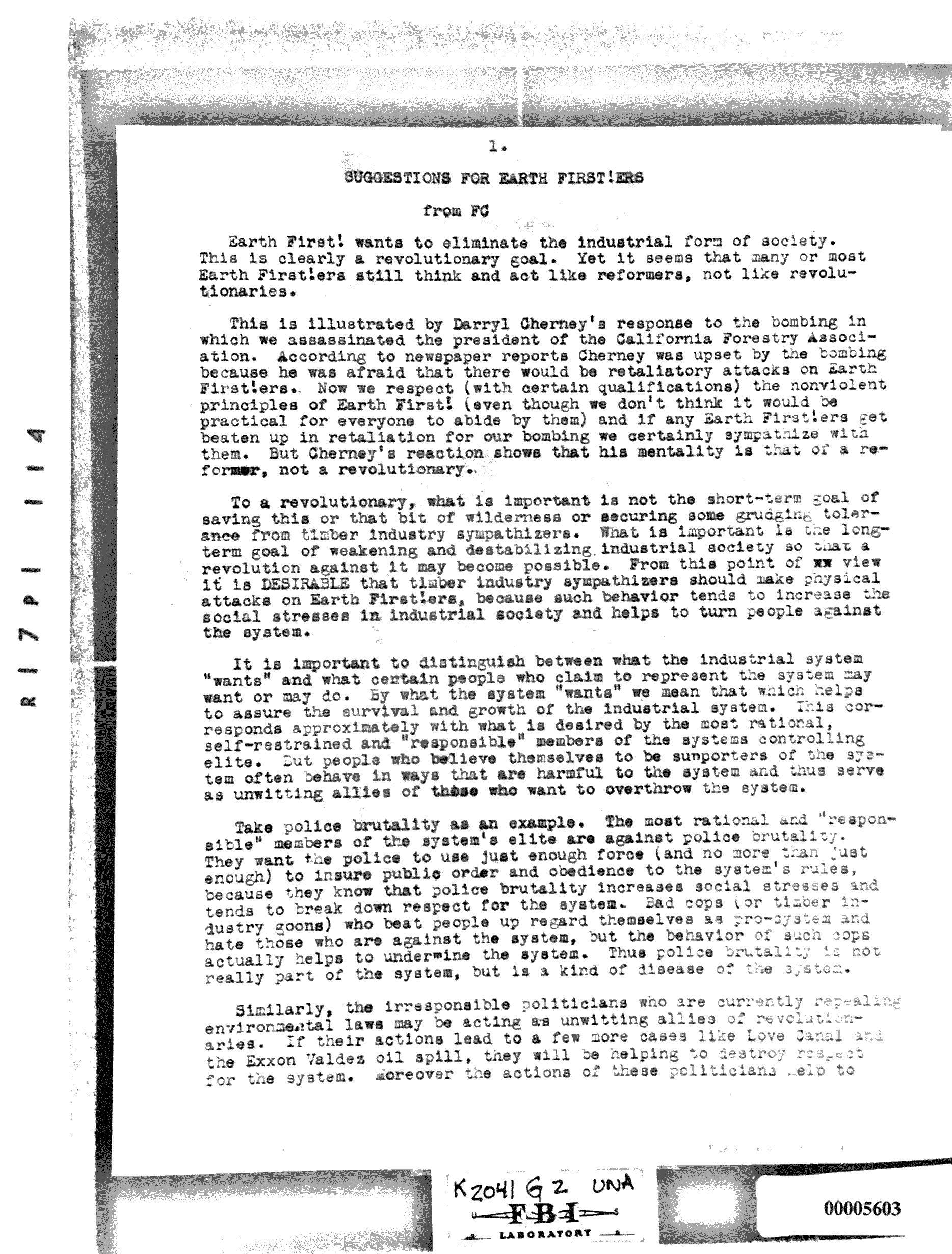
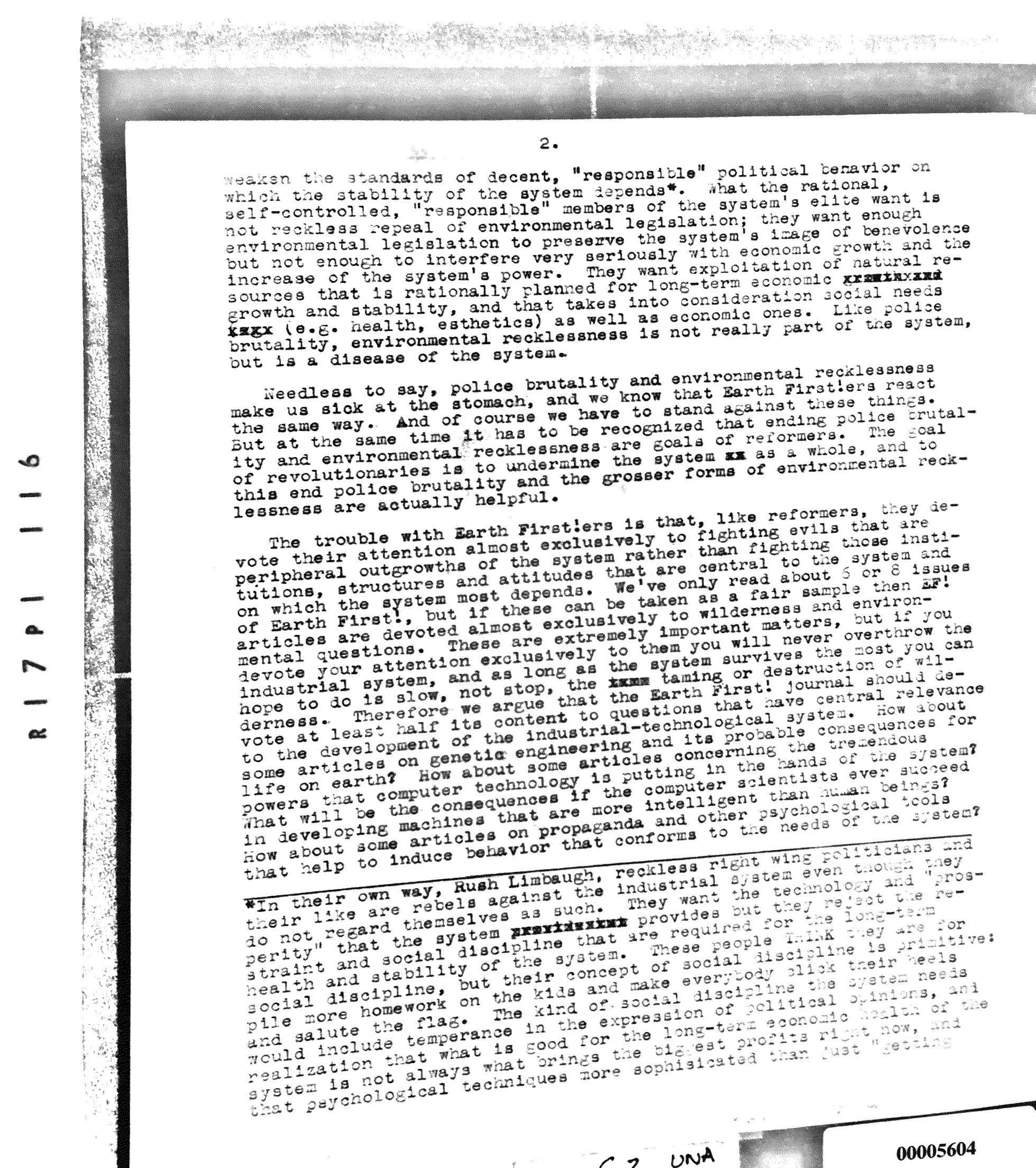


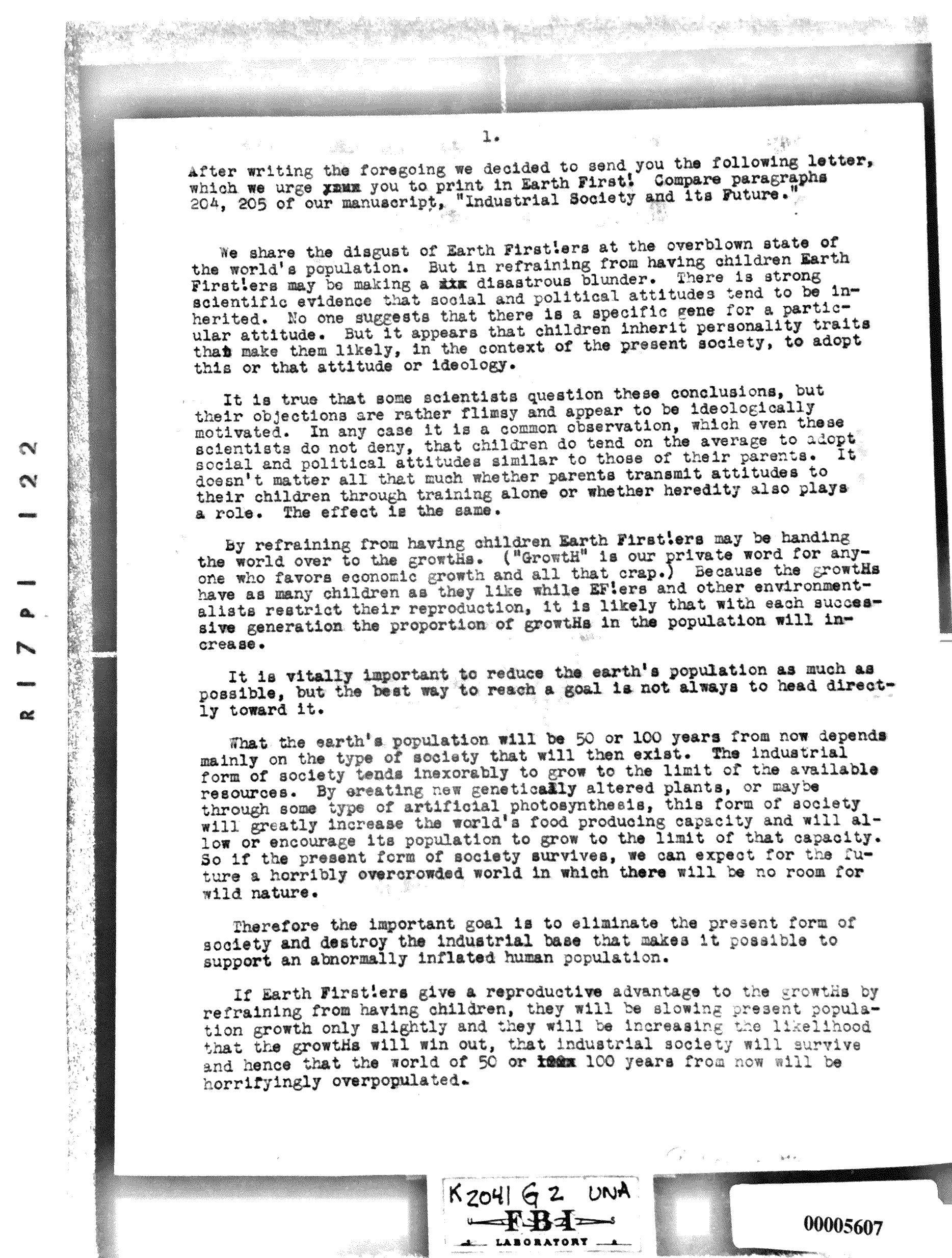

{1} In their own way, Rush Limbaugh, reckless right wing politicians and their like are rebels against the industrial system even though they do not regard themselves as such. They want the technology and “prosperity” that the system provides but they reject the restraint and social discipline that are required for the long-term health and stability of the system. These people think they are for social discipline, but their concept of social discipline is primitive: pile more homework on the kids and make everybody click their heels and salute the flag. The kind of social discipline the system needs would include temperance in the expression of political opinions, and realization that what is good for the long-term health of the system is not always what brings the biggest profits right now, and that psychological techniques are more sophisticated than just “getting tough” are needed to make children behave in conformity with the needs of the system. Through their irrational antics and lack of self-restraint Rush Limbaugh & Co. are helping to weaken the system. Our most dangerous enemies are not reckless right-wingers but those leaders who take a rational and balanced approach to promoting the growth and power of the system. That is why we of FC always make it our policy to vote for those politicians who are most corrupt, incompetent or irrational. They are the ones who will help us break down the system. Pete Wilson said we deserve to die for blowing up the president of the California Forestry Association. He shouldn’t be so ungrateful. We voted for him.
